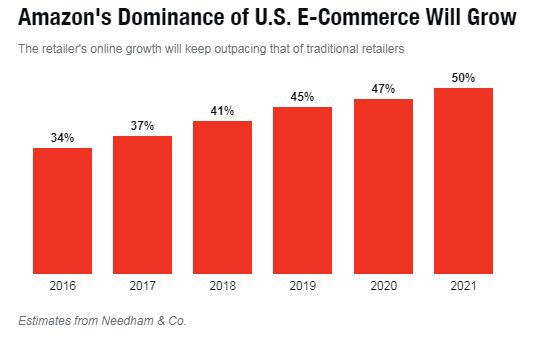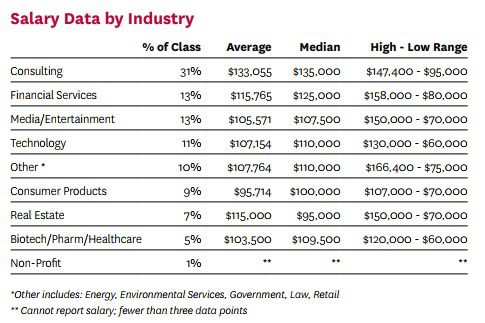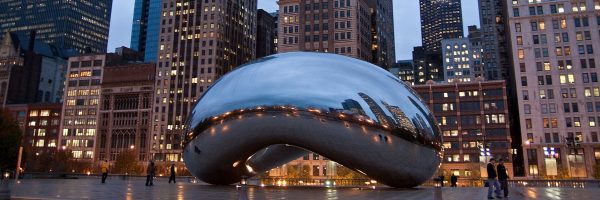New Amazon Headquarters Bidding Race Begins, with 50,000 New Jobs on the Line

By October 19, bids for the newest Amazon headquarters (dubbed HQ2) will close. For the eCommerce giant, it’s another benchmark for an already historic year.
Following its outward commitment to more hiring and the landmark purchase of grocery store chain Whole Foods earlier this summer, Amazon just announced it will be establishing a new non-satellite headquarters outside of Seattle for the first time, which is expected to bring 50,000 jobs to a select city that bids for hosting duties. With the announcement, Amazon notes, “We are looking for a location with strong local and regional talent—particularly in software development and related fields—as well as a stable and business-friendly environment to continue hiring and innovating on behalf of our customers.”
In the six-page Request for Proposal form, which can be read here, Amazon notes a preference for North American cities that have the following:
- “Metropolitan areas with more than one million people.”
- “A stable and business-friendly environment.”
- “Urban or suburban locations with the potential to attract and retain strong technical talent.”
- “Communities that think big and creatively when considering locations and real estate options.”
Assuming Amazon does elect to build in a city with those population restrictions, there are only nine possible U.S. locations: New York City, Los Angeles, Chicago, Houston, Philadelphia, Phoenix, San Antonio, and Dallas. Three Canadian cities—Toronto, Montreal, and Vancouver—also hit the qualifying population figure.
In Philadelphia, Mayor Jim Kenney quickly announced the city’s intent to enter the bidding war. Chicago Mayor Rahm Emanuel also seems to be close to the effort. However, there may be reason to believe that Texas will be the eventually landing spot for HQ2, where 53-year old CEO Jeff Bezos spent much of his youth.
In a statement, Bezos said, “We expect HQ2 to be a full equal to our Seattle headquarters. Amazon HQ2 will bring billions of dollars in upfront and ongoing investments, and tens of thousands of high-paying jobs. We’re excited to find a second home.”
Local Economic Growth
Amazon notes that the host city will receive a boon beyond more lucrative job opportunities. In its announcement, the company, which employs nearly 400,000 people worldwide (not including short-term seasonal employees), detailed its financial impact in Seattle, which “resulted in an additional $38 billion to the city’s economy–every dollar invested by Amazon in Seattle generated an additional $1.40 for the city’s economy overall.”
As well, the company created more than 40,000 direct jobs in the Emerald City, and 53,000 additional jobs “as a result of Amazon’s direct investments,” according to the U.S. Bureau of Economic Analysis. In the Request for Proposal form, the company promises it “will hire as many as fifty thousand (50,000) new full-time employees with an average annual total compensation exceeding one hundred thousand dollars ($100,000) over the next ten to fifteen years, following commencement of operations.”
According to Wall Street firm Needham & Co., Amazon is expected to control 50 percent of all U.S. online sales by 2021. The ever-increasing market dominance has earned Amazon a fairly negative reputation, but has done little to deter growth.

Via Fortune
Seattle has also been witness to years of skyrocketing housing costs due to the immense economic growth. The Seattle Times notes “the median price hit $730,000, up nearly 17 percent from a year ago” for houses. Amazon and the rest of the Seattle corporate community may not be the only players responsible for the unusually high prices, but it is an inescapable part of the equation.
In a recent interview, Columbia Business School professor Rita McGrath said that Amazon may be looking for a location with less staggering housing costs.
“It’s hard to attract people if they can’t afford the housing available locally,” she said.
The Amazon MBA Impact
Last year, we highlighted Amazon’s massive effect on the MBA job market. The company creates a direct pipeline from its MBA internship program to full-time employment, which should rapidly increase with the creation of HQ2. In a previous interview with the Financial Times, Miriam Park, the Amazon Director of University Programs, highlighted the company’s recruitment strategy:
“The Amazon recruitment process is designed to ensure we hire top candidates with high-growth potential whatever their background may be. As part of this we recruit current MBA students and MBA alumni for permanent and internship opportunities worldwide and see MBAs as an important part of our leadership development. We value people who can balance long-term strategic thinking with tactical execution, and who have the ability to make data-driven decisions.”
The internship programs open opportunities for MBAs to join the company as senior product managers, operations analysts, and more. Throughout the Request for Proposal form, Amazon frequently reiterates its desire to build in a location that has a strong academic culture, writing, “a highly educated labor pool is critical and a strong university system is required.”
Amazon will formally announce where it will build HQ2 next year.
MIT Sloan Startup LaborX Bridging the Tech Job Divide

There’s a widening rift between employers that need high-end tech employees and a stagnant workforce. Dominican-born, Bronx-raised MIT Sloan MBA ’14 grad Yscaira Jimenez’s soon-to-be-launched LaborX can help wedge the divide.
Getting Paid: Highest MBA Salaries in Los Angeles

The transmissions Los Angeles sends back out into the ether are those culled from the desires of its inhabitants but also from the people who romanticize it from the outside. As Joan Didion once wrote, “The city burning is Los Angeles’s deepest image of itself.”
Los Angeles is, admittedly, polarizing. While some may find the not-so-authentic atmosphere of Hollywood to be a downtrodden, morose landscape, the city’s expansive diversity and subtle natural wonder is enthralling in its own right. In a way, it feels alien and utterly familiar all at once.
It’s this kind of uncertainty that makes Los Angeles an ideal place to pursue a business degree for a prospective MBA open to a bit of ambiguity. While Silicon Valley up north has traditionally been romanticized as a place where we can re-write the rules, LA has been catching up recently—and fast. Los Angeles has embraced the tech boom in a big way, with many Valley bigwigs and new startups alike moving their operations to Silicon Beach on the West Side. With that in mind, the new era of LA innovation is creating some lofty starting salaries, particularly for MBA graduates.
The Highest Los Angeles MBA Salaries
UCLA Anderson School of Management
Recent UCLA Anderson graduates earned an average starting salary of $121,250 with a $25,000 signing bonus, according to statistics released by the school. Over 92 percent of Anderson MBAs received job offers within three months of graduation. The top five industries to employ Anderson MBAs are in tech (30.6 percent); financial services (21.6 percent); consumer products (13.4 percent); and consulting services (13.4 percent). Top employers for Anderson graduates include: Amazon, Deloitte, Bank of America Merrill Lynch, Google, Microsoft, Adobe, Amgen, BCG, EY, Mattel, McKinsey & Company, Nike, PwC, Apple, AT&T, Autodesk, Citigroup, Credit Suisse, Epson, Goldman Sachs, Intel, Sony Pictures Entertainment, and Disney, among others
UC Irvine Merage School of Business
MBA graduates from the UC Irivine Paul Merage School of Business posted record employment numbers for the school. Over 90 percent of recent MBAs received job offers within three months of graduation. The most popular industries to attract Merage graduates were in technology (33 percent), finance (31 percent), consulting (24 percent), and marketing/sales (27 percent). Merage graduates with tech industry positions earned starting salaries of $105,000; consulting, $100,000; consumer products, $85,000; and financial services, $100,000. Top employers included: Amazon, AT&T, Bank of America, Cisco, Dell, Deloitte, Gap, Hulu, Hyundai, IBM, Mattel, NBC Universal, Taco Bell, Twitter, and Volcom.
USC Marshall School of Business
According to employment statistics surveying the most recent USC Marshall School of Business MBA class, the average starting salary for Marshall graduates is $115,309 with a $23,431 signing bonus. The top three industries that employ Marshall graduates are within consulting (34 percent), where MBAs start at $132,000; marketing/sales (27 percent), where MBAs start at $99,497; and financial services (18 percent), where MBAs start at $112,087. Top employers of Marshall’s 2016 class include: Adobe, AT&T, Apple, Citigroup, Deloitte, Disney, Facebook, Film Roman, Google, Hewlett-Packard, Intel, Morgan Stanley, Johnson & Johnson, Samsung, Taco Bell, Warner Bros, Starbucks, PwC, Sony Pictures, Nestle, and PepsiCo, among others.

USC Marshall grad salaries, broken down by industry.
Pepperdine Graziadio School of Business and Management
Pepperdine Graziadio School of Business and Management graduates earned an average starting salary of $120,000, according to school statistics. Around 82 percent of Graziadio MBAs accepted job offers within three months of graduation.
Financial services, entertainment, technology, and consulting were the top industries to employ Graziadio MBAs.
For more information on the best Los Angeles MBA programs, check out our guide to the city. As well, learn more about which LA schools do not require GMAT or GRE scores here.
Your Guide to the Most Affordable MBA Programs in Dallas

An MBA provides professionals with increased career flexibility and greater earning potential. Unfortunately, the sizable cost of graduate school can be a hindrance to students motivated to earn an MBA. The shackles of student loan debt can haunt former students well into their professional lives.
Luckily, many schools appreciate the toll a high price tag can take on students, and offer more realistic fees and resources. With this in mind, we’ve laid out three of the most affordable Dallas MBA programs.
Commerce College of Business — Texas A&M University
The Texas A&M Commerce College of Business offers a relatively affordable experience for aspiring MBAs. The school is particularly sensitive to the financial stress pursuing MBA can cause. This is why the school follows the [In]tuition plan. Commerce’s [In]tuition guarantees the cost of commerce students’ educations will not will remain the same from registration until graduation, so that students do not have to worry about rising costs and fees from year to year. According to their tuition calculator, a graduate student who lives off campus and is a Texas resident could pay a tuition as low as $5,775.06 per year. The program averages about two years. Commerce accepts a long list of outside scholarships, and they offer institutional scholarships based on academic achievement.
The cost may also be reduced for students who completed the appropriate undergraduate courses, which could waive six pre-requisite courses. Commerce offers 13 minor options, such as Accounting, Business Analytics, Corporate Management, and Cyber Security. Commerce students benefit from the flexibility of the plethora of online courses offered by the school.
Naveen Jindal School of Management — University of Texas at Dallas
At the Naveen Jindal School of Management, residents pay around $32,998, factoring in tuition and fees, and nonresidents pay about $64,332 for the full-time MBA. In the past few years, the university offered scholarships to 75 percent of their incoming full-time MBA students. There are two types of merit-based scholarships for full-time MBAs in this program: Cohort and Corporate. These are both merit-based and students must apply to be considered.
U.S. News & World Report ranked Naveen Jindal as the 38th best business school in the country, which boasts an impressive 90 percent employment rate for full-time MBA grads. Students have recently gone on to earn high ranking positions at companies like Amazon and Toyota.
University of North Texas College of Business
As of the 2016-17 school year, the total cost of an MBA at University of North Texas College of Business was about $41,780 for residents and $56,468 for non-residents. At UNT, students can apply for a variety scholarships to cut tuition costs for many different types of students. For example, the Lupe Murchison Foundation Graduate Fellowship is a scholarship awarded to students, not based purely on need or academic achievement, but also on the student’s effort and promise.
UNT also offers a prestigious Online MBA for students looks for a more accommodating schedule. The school also offers afternoon, evening, and weekend classes for students looking for schedule flexibility, and who also wish to experience the on-campus community.
For more valuable information about the best MBA programs Dallas has to offer, check out our guide to the metro and which schools don’t require GMAT/GRE scores for admission.
Getting Paid: Highest MBA Salaries in Chicago

Like most parts of the country, the U.S. heartland is undergoing a massive shift on all fronts, becoming more urbane, diverse, and open to outsiders than seemingly ever before.
Many communities are becoming increasingly diverse, attracting international residents at an unprecedented rate. Young, urban professional-types who once flocked to the coasts are now moving in droves to Midwestern cities, which were once dismissively filed under “fly-over territory.” Nowhere is this change more apparent than in the Windy City.
Chicago’s long been home to major players in media, education, finance, and food and beverage (shout-out to Giordano’s Deep Dish Pizza), but doing business in the city now also means something new. Like most major metropolitan areas, Chicago’s slowly dipping its toes into the tech game; the city’s home to Groupon, Grubhub, Orbitz, and Reverb.
So, take your pick, aspiring MBAs! When it comes to Chi-City, you’ll be a veritable kid in a candy store.
The 5 Highest Chicago MBA Salaries
Northwestern Kellogg School of Management
Northwestern Kellogg School of Management graduates earned average starting salaries between $106,000-$138,000, depending on their chosen industry. According to recent statistics, the four most popular industries to attract Kellogg MBAs were consulting (32.6 percent), where the starting salary hovers around $138,204 with a $29,375 signing bonus. MBAs in tech (22 percent) earned a starting salary of $119,713 with a $23,749 signing bonus. MBAs that specialize in consumer products (13.8 percent) earned an average starting salary of $106,052 with a $26,634 signing bonus. MBAs in financial services (12.8 percent) earned an average starting salary of $128,090 with a $32,100 signing bonus. Top employers of Kellogg graduates include: Adobe Systems, Amazon, Anheuser-Busch, Apple, Bain & Co, Bank of America Merrill Lynch, Boston Consulting Group, Cisco Systems, DaVita Healthcare Partners, Dell, Deloitte, Facebook, General Motors, Goldman Sachs, Google, JPMorgan Chase, Linkedin, Mars, McKinsey & Company, Microsoft, Nike, PepsiCo, among others
DePaul Kellstadt Graduate School of Business
Recent graduates from the DePaul Kellstadt Graduate School of Business posted record employment numbers for the school. According to an overview the school published, 92 percent of 2016 MBAs landed positions within 120 days of graduation. The average starting salaries for Kellstadt’s available MBA concentrations are as follows: Accountancy at $83,000; economics at $90,000; finance at $89,000; management at $83,000; marketing at $75,500; and real estate at $75,000. The most popular industries to attract Kellstadt graduates were accounting, financial services, manufacturing, health care, and consulting. Top employers include: Allstate, Bank of America Merrill Lynch, Boston Consulting Group, Deloitte, Deutsche Bank, GE Capital, General Mills, Google, Groupon, JPMorgan Chase, Microsoft, PwC, United Airlines, and Wilson Sporting Goods, among others.
Notre Dame’s Mendoza College of Business
According to statistics surveying the most recent MBA class, the average starting salary for Mendoza College of Business graduates is $105,000 with a $20,000 signing bonus. About 91 percent of MBAs received job offers within three months of graduation. The most popular industries to attract Mendoza MBAs are within tech (27.1 percent), financial services (18.8 percent), consumer products (14.6 percent), and consulting (11.5 percent). MBAs working in tech earned average starting salaries of around $110,000; financial services, $110,000; consumer products, $100,000; and consulting, $105,000. Top employers of Mendoza MBAs include: Deloitte, Procter & Gamble, PwC, Deutsche Bank, IBM, Discover, Allstate, IBM, Samsung, Amazon, American Airlines, ExxonMobil, Johnson & Johnson, AT&T, Kraft, Hershey, Heinz, Bank of America Merrill Lynch, Major League Soccer, United Airlines, General Mills, General Motors, Microsoft, GlaxoSmithKline, and Citibank, among others.
University of Chicago Booth School of Business
Chicago Booth School of Business graduates earned an average starting salary of $125,000, according to recent statistics. The top industries to attract Booth MBAs are financial services (36 percent), consulting (27.5 percent), and technology (16.7 percent). Booth MBAs working in financial services earn average starting salaries of $125,000 with a $40,000 signing bonus; consulting, $145,000 with a $25,000 signing bonus; technology, $125,000 with a $30,000 signing bonus. Top employers of Booth graduates include McKInsey & Company (7.1 percent), Boston Consulting Group (4.7 percent), Amazon (3.9 percent), Bain & Company (3.1 percent), Accenture (2.6 percent), Google (2.4 percent), Bank of America Merrill Lynch (2.2 percent), and PwC Strategy (2 percent).
University of Illinois at Chicago Gies College of Business
On average, Gies College of Business graduates can expect to start their careers in the $90,000 range with a $10,000 signing bonus. According to statistics supplied by the school, MBA grads have a 94 percent employment rate. The most popular industries are technology (20.3 percent), financial services (18.8 percent), consulting (15.6 percent), and consumer products (12.5 percent). Liautaud MBAs who took positions in tech started at $94,000; financial services, $87,857; consulting, $89,125; and consumer products, $95,800. Liautaud graduates work for a broad range of companies, but top employers include AT&T, Johnson & Johnson, Walt Disney, Amazon, Chrysler, Hewlett-Packard, Sears, Google, State Farm, City of Champaign, Bank of America, and Whirlpool Corporation.
Graduate With A Dual MBA Degree at Northwestern’s Kellogg School

When going for that MBA, why not just go for two graduate degrees? That’s possible at Northwestern University’s Kellogg School of Management.
The business school, tucked inside Chicago, offers two dual MBA programs. Some of its graduates have gone on to work for Amazon and Microsoft. Plus, living in Chicago is a bonus.
The Windy City has vibrant arts, food, and comedy scenes, as well as a growing number of traditional career opportunities. Though the state of Illinois is suffering financially, Chicago saw a jump in employment following the Great Recession. The city is also home to headquarters for some of the biggest banks in the country.
Really, isn’t deep-dish pizza all a person needs though? Candidates can enjoy some Chicago-style pizza (if they’re into that kind of thing) while studying hard to achieve that dual degree.
Masters of Science in Design Innovation (MMM)
According to the school, this program is the first of its kind. Graduates walk away with their Kellogg MBA—and a Masters of Science in Design Innovation from Segal Design Institute at the McCormick School of Engineering and Applied Science.
That’s a steal. Especially given that this takes no more than two years. Candidates who want to build a successful business with a strong focus on design should really benefit from this program. Some design tools students learn while at Kellogg include user-centered research methods, prototyping, and implementation.
But every student has a specific interest. The program’s electives allow participants to hone in on whatever skills they need to succeed. These courses can look like programming design or even whole-brain communication.
“The MMM program challenges me to be more dynamic: in thought, in understanding, and in action,” Kellogg student Vikram Raju said on the school’s website.
The Kellogg MMM is a full-time program, offering classes during both the day and evening.
JD/MBA Program
This program is tailored specifically to the business-savvy with an interest in law. The JD/MBA program offers graduates a Masters of Business Administration from Kellogg, as well as a Juris Doctor from the Northwestern School of Law.
Again, Kellogg set an example with this program: It’s the first kind in the U.S. Be it for someone who ultimately wants to do law or someone who wants to hold a unique set of business skills, the JD/MBA program uniquely positions its graduates for the real world. Law firms, corporations, and nonprofits look to Kellogg’s JD/MBA graduates. Some alumni even go onto elected office.
“This program attracts people who are leaders,” JD/MBA student Adina Lord said on the program’s website.
This program takes three years (one year more than the MMM), but it’s worth it. The average student takes five years to achieve these degrees separately.
While working toward the MBA, students can choose an expertise: accounting, economics, and marketing, among others. Then, there’s the legal background on top. And the practice is hands on.
While at Kellogg, students can work with Northwestern’s Entrepreneurship Law Center, Global Lab, or Venture Lab. All these resources give students experience they need to attract future employers. The Law Center connects students with small businesses, where they can give businesses legal and strategic consulting.
